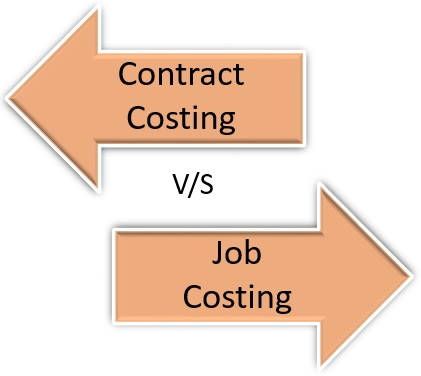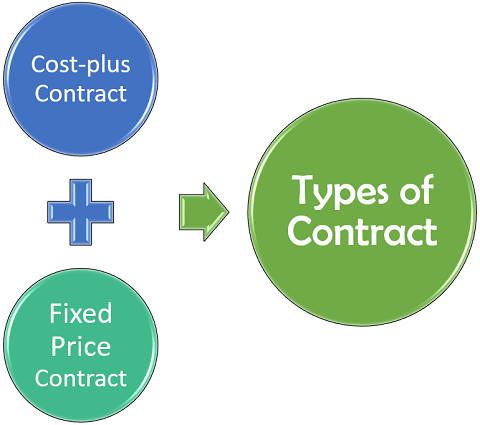Definition: Contract Costing is an accounting of a long-term contract work usually applicable on construction work such as building construction, bridge construction, road construction and other long-run engineering works which take long duration in completion, i.e., a year or more.
However, contract costing is very much similar to job costing but is not same, in contract costing cost of each contract is calculated separately, and a separate account is opened for every contract in the books of the contractor to find the profit or loss the total cost of the contract is divided amidst two parts, i.e. work certified and work uncertified.
Contract costing is a big job in which work is done on the contractee’s place or site and not inside the factory premises like job costing.
Content: Contract Costing
- Format of Contract Account
- Features of Contract Costing
- Types of Contracts
- Difference between Contract Costing and Job Costing
- Conclusion
Format of Contract Account
Contract Account
For the year ended 31 Dec 2019
| Particulars | Amount (₹) | Particulars | Amount(₹) |
|---|---|---|---|
| To Material at site | xx | By Material at site | xx |
| To Wages paid (+) Outstanding (-) Prepaid | xx xx xx ------ XXX | By Material returned | xx |
| To Direct Expenses (+) Outstanding (-) Prepaid | xx xx xx ------- XXX | By cost of contract b/d | xx ------ XXX ------ |
| To Depreciation on Plant and machinery | xx | By Work in Progress *Certified *Uncertified | xx xx ------ XXX |
| To Other Overheads (+) Outstanding (-) Prepaid | xx xx ------- XXX | ||
| To Cost of contract b/d | xx | ||
| To Notional Profit c/d | xx ------- XX ------- | ------- XX ------- |
|
| To P/l Account | xx | By Notional Profit b/d | |
| To Reserve Account | xx |
Features of Contract Costing
The features of contract costing are as follows:
- Contract costing is done for a long-term contract work, generally for more than one year.
- Contract work is not fixed with a particular location it varies from site to site for different contracts.
- Accounts for every single contract is maintained individually.
- The contractee makes partial payments to the contractor according to the percentage (%) of work certified by the architect.
- The major portion of expenses incurred in contract costing is on direct expenses such as labour expenses, material expenses, and other direct expenses.
- Plant and machinery used for every contract may differ; thus, it can be purchased or may be hired from outside.
- A contractor may get penalized if the contract work is not completed within the stipulated time, as mentioned in the contract.
Types of Contracts
The contracts in contract costing are generally divided amidst two types; they are as follows:
Cost-plus Contract
In this type of contract price of the contract is not fixed while entering in a contract; however, it gets decided by summing up the profit amount in the actual cost incurred in the contract.
All other extra costs incurred in a contract, due to market fluctuations also needs to be compensated by the contractee along with the fixed amount of cost as a profit.
This type of contract is embraced to overcome the problems of contract price fixing because of material ambiguity, technological changes, etc.
The government generally adopts Cost-plus contracts for special work like dam construction in which actual cost cannot be predicted.
The contractor and contractee both have some advantages as well as disadvantages of the cost-plus contract; they are discussed below-
From the contractor’s point of view, one of the advantages is that the risk of loss in such contract is nil.
On the other hand, the disadvantage is that the contractor will not get the privilege of favourable market price changes.
From the contractee’s viewpoint, one of the advantages is that the contractee gets assured regarding the fair price of the contract by having a right to audit contractor’s books of accounts.
And the disadvantage from contractee’s view is that the final price which the contractee has to pay for the contract cannot be ascertained untill the contract gets completed.
Fixed Price Contract (with Escalation Clause)
This type of contract is just opposite to the cost-plus contract, in this both parties agreed on a fixed price of a contract for a particular project and payments will not fluctuate because of any resource or time expansion during the contract work.
Thus these types of contract are cost control contracts, and the risk of loss is high on the contractor’s side. However, such contracts fail in general if signed without escalation clause as a contractor back out from the project if they feel it unbeneficial or the cost exceeds the limit of the contractor’s limit.
Despite facing failures, such contracts are more prevalent in the market; however, it seems beneficial if the cost is adequately ascertained in advance and are prepared with an escalation clause.
Here the benefit for the contractee is budgeting, i.e., allocation of money can be done as the price of a contract is fixed, and the contractor also enjoys the reward as a high contract price because of taking the risk of loss.
To understand it properly, we also need to understand what the escalation clause is?
So, here is the answer to it:
Escalation clause implies the cover for the changes in the price; it is a provision which determines the amount by which contract price is to be modified when the prices of goods and services changes.
This clause seems beneficial for both the contractor as well as contractee as the contractee gets entitled to appropriately increase the price of the contract if it raises beyond the limit; thus it protects the contractor’s interest.
On the other hand, contractee gets discharged from making unnecessary more amount of payments.
Difference between Contract Costing and Job Costing

Some of the major differences amidst contract costing and job costing are as follows:
- Contract costing is generally done for a long time because of the vast size of the contract; in contrast, job costing is done for a short time as jobs are of small size.
- Allocation of cost in contract costing is directly made in the contract account; in contrast in job costing direct allocation of cost is not possible.
- Contract work is done on the various sites or places as per customer’s demand; in contrast, jobs are performed inside the workshop.
- In contract costing, most of the expenses are of direct nature, and very few indirect expenses are incurred; in contrast, in job costing a large number of indirect expenses are incurred.
- In contract costing prices are affected by the clauses of the contract; in contrast in job costing pricing gets affected by the organization’s policy.
Conclusion
Contract costing is a costing in which each costing initiated is considered as a cost unit, and individual accounts are maintained in the books of accounts of the contractor for every single contract.
Contract costing is generally applied to long-term projects such as construction work, engineering work, etc.

Leave a Reply